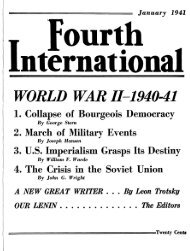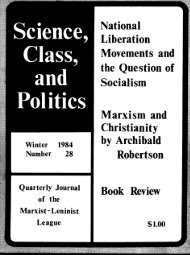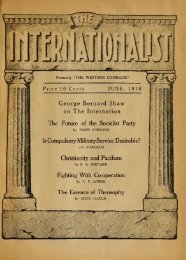The Stalin school of falsification - Marxists Internet Archive
The Stalin school of falsification - Marxists Internet Archive
The Stalin school of falsification - Marxists Internet Archive
You also want an ePaper? Increase the reach of your titles
YUMPU automatically turns print PDFs into web optimized ePapers that Google loves.
<strong>Stalin</strong> School <strong>of</strong> Falsification -- Chapter 9<br />
insurrection and the Provisional Government, contained the central portion -- consult the protocols -- that<br />
was written by me, and I am proud <strong>of</strong> it. Have any <strong>of</strong> my critics perhaps something similar to list among<br />
their assets?<br />
In 1905, a whole number <strong>of</strong> proclamations issued in Baku in the underground Bolshevik printshop were<br />
written by me: the one to the peasants on the occasion <strong>of</strong> January 9; another on the Czarist agrarian laws,<br />
and so on. In 1905, in November, Novaya Zhizn, under the editorship <strong>of</strong> Lenin, solidarized itself with my<br />
articles in Nachalo[57] on the nature <strong>of</strong> our revolution. And I was expounding in them the so-called<br />
theory <strong>of</strong> the permanent revolution.<br />
ORDJONIKIDZE: Nevertheless you happened to be with Nachalo and not Novaya Zhizn. Isn't that so?<br />
TROTSKY: But you have apparently forgotten that at that time the Bolshevik C.E.C. headed by Lenin<br />
unanimously adopted a resolution in favor <strong>of</strong> unity between the Bolsheviks and Mensheviks. Within a<br />
few weeks, Nachalo was merged with Novaya Zhizn, and the latter wrote in warm praise <strong>of</strong> my articles<br />
on more than one occasion. This was the period <strong>of</strong> the tendency toward unification. Ynuhide the fact that<br />
I worked hand in hand with the Bolsheviks in the 1905 Soviet. You hide the fact that in 1906 Lenin<br />
published in Novaya Volna my pamphlet "Our Tactics" which defined our attitude toward the peasantry<br />
in the revolution. You hide the fact that at the London Congress in 1907, Lenin referred favor ably to my<br />
attitude towards the bourgeoisie and the peasantry.[58] I maintain that my differences with Bolshevism<br />
were never greater than those <strong>of</strong> Rosa Luxemburg and Karl Liebknecht upon those questions on which<br />
they also differed from Bolshevism. Let anyone dare assert that they were Mensheviks!<br />
I was not a Bolshevik at that time. But I was never guilty <strong>of</strong> such monstrous blunders as the preservation<br />
<strong>of</strong> the Anglo-Russian Committee, or the subordination <strong>of</strong> the Chinese Communist Party to the<br />
Kuomintang.<br />
KRYVOY: What about the Vienna platform?<br />
TROTSKY: Are you referring to the bloc[59] in August 1912?<br />
KAYVOV: Yes.<br />
TROTSKY: That was the fruit <strong>of</strong> conciliationism. I had not yet lost hope at the time <strong>of</strong> the possibility <strong>of</strong><br />
uniting the Bolsheviks and the Mensheviks. But let not Ordjonikidze, Yaroslavsky and the others forget<br />
that they themselves participated in 1917-not in 1912, mind you, but in 1917-in joint organizations with<br />
the Mensheviks. <strong>The</strong> Vienna Conference was one <strong>of</strong> the attempts at conciliationism. It was not at all my<br />
intention to make a bloc with the Mensheviks against the Bolsheviks. I still had hopes <strong>of</strong> reconciling the<br />
Bolsheviks with the Mensheviks, and sought to unite them. In this as in all other instances, Lenin refused<br />
to have anything to do with such an artificial unification. As a result <strong>of</strong> conciliationist policies, I found<br />
myself formally in a bloc with the Mensheviks. But the struggle between us flared up instantly, almost on<br />
the very next day; and the outbreak <strong>of</strong> the war found us irreconcilable opponents. Incidentally, <strong>Stalin</strong>,<br />
throughout this period, was himself rather a vulgar conciliationist and, moreover, during the most acute<br />
moments. In 1911, <strong>Stalin</strong> wrote concerning the struggle between Lenin and Martov that it was "a tempest<br />
in a teapot." This was written by a member <strong>of</strong> the Bolshevik party. In March 1917, <strong>Stalin</strong> was in favor <strong>of</strong><br />
unity with Tseretelli. In 1926, <strong>Stalin</strong> was in favor <strong>of</strong> a bloc with Purcell, Chiang Kai-shek and Wang<br />
Ching-wei. My mistakes are trifling indeed when compared with these mistakes. My activity from 1914<br />
to 1917, i.e., during the war, is being distorted ruthlessly, after the easy manner <strong>of</strong> that simon-pure social<br />
http://www.marxists.org/archive/trotsky/works/1937-st2/sf09.htm (14 <strong>of</strong> 21) [06/06/2002 15:07:02]

















